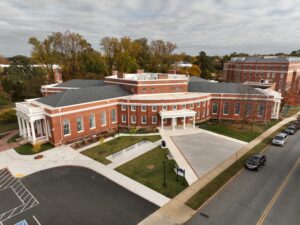Students interested in becoming high-school STEM-subject teachers now qualify for up to two years of funding at the University of Mary Washington, with the establishment of the Noyce Teacher Scholarship Program at UMW. Funded by a $1.4 million five-year National Science Foundation (NSF) grant, the Noyce Program brings a nationally acclaimed teacher preparation program to one of Virginia’s historic teacher colleges, which now excels in undergraduate education across the liberal arts and sciences.

“This NSF-funded project will create powerful learning experiences for students who want to teach in STEM fields. I am deeply grateful to the team that spearheaded this project. This will help address the serious teacher shortage in these high-demand disciplines,” said UMW College of Education Dean Pete Kelly.
UMW, in partnership with Germanna Community College, will use the NSF’s Robert Noyce Teacher Scholarship Program funds to recruit, train and retain teachers of science, technology, engineering and math in secondary schools considered high-need.
Current and future UMW students and Germanna transfer students – whether majoring in education or not – can be considered for the program, which provides up to $24,000 per student in each of their last two undergraduate years. In return for each year’s scholarship, Noyce Scholars commit to two years of teaching biology, chemistry, computer science, Earth science, math or physics in qualifying schools.
Funds will also support efforts to reach current UMW undergraduates who may not have decided on an academic major or career path, said Professor of Education Venitta McCall, the grant’s principal investigator.
UMW will also be able to reach potential college students while they’re still in high school themselves, via statewide outreach to secondary schools and organizations that work with teenagers. “We will cast a wide net, with strong collaborative ties throughout the community,” McCall said.
UMW’s project is called DISCOVER, short for “Developing Identities in STEM to Cultivate Opportunities that Validate, Empower, and Retain.” It will focus on culturally relevant pedagogy and preparing students to work with diverse students. To that end, McCall said, DISCOVER will encourage potential teachers from minoritized populations, a term that covers not only those from diverse racial and ethnic groups but also emerging English language speakers and people with disabilities.
Receiving the NSF Noyce grant places UMW among top in-state colleges and universities that have designed Noyce projects and received funding. Over the Noyce program’s 20-year history, 16 Virginia higher education institutions have received funding for a variety of initiatives.
This is the first Noyce grant for UMW, McCall said, and it represents the dedication of numerous UMW and Germanna contributors who worked to develop the project and grant application. They include co-principal investigators Leanna C. Giancarlo, associate professor of chemistry; Kyle T. Schultz, associate professor of education; Brittany A. Garvin-Hudson, assistant professor of education; and John E. Stroffolino, Germanna’s dean of arts and sciences.
Also instrumental are UMW’s Debra Hydorn, professor of mathematics; Holly Schiffrin, professor of psychological science; Kristina Peck, College of Education director of clinical experiences and partnerships; Michael Stebar, senior lecturer of biology; and Germanna faculty members Teresa Conour and Keith King.
The Noyce grant is one of three UMW active NSF grants and dozens of completed grants. The other two active grants support UMW’s Jepson Scholars Program and fund a multi-university collaboration for TPX3Cam, enabling experiments that probe the interactions of molecules.
Students interested in applying to be a Noyce Scholar at UMW should start with an application for admission at https://www.umw.edu/admissions/apply/.
